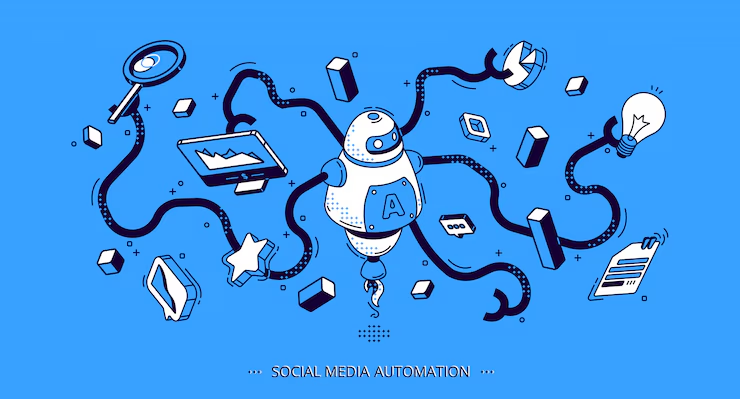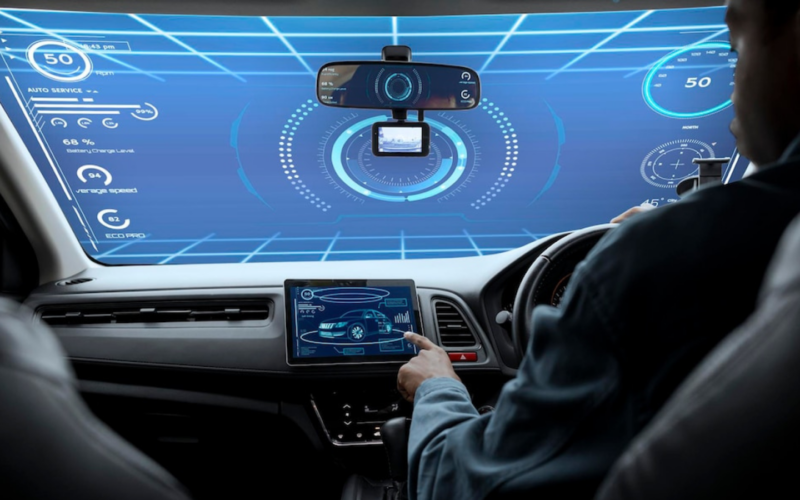Social media has become a critical driver of business growth, but managing it effectively has never been more challenging. From constantly creating fresh content to engaging with customers and tracking performance, the tasks pile up quickly. What starts as a few posts each day can turn into a never-ending list of responsibilities, taking time and focus away from more strategic goals.
The issue is clear: manually managing social media takes up too much time and resources. And with the pressure to stay competitive, every minute spent on repetitive tasks is a minute that could be better spent elsewhere.
This is where automation steps in. By handling routine tasks, such as content creation, customer interactions, and data analysis, your team can focus on driving results. Automation doesn’t replace your team; it frees them up to accomplish more with less effort, opening up new opportunities for growth and efficiency.
In this post, we’ll explore how automation can solve these challenges, simplify your social media processes, and ultimately deliver better results for your business.
What is AI in Social Media Marketing?
AI transforms social media marketing by improving the efficiency and accuracy of decision-making. It processes large volumes of data quickly, uncovering patterns and trends that help shape strategies and optimize campaigns in real time. AI doesn’t just save time; it ensures decisions are backed by solid data, improving the effectiveness of every campaign.
Unlike traditional tools, which rely on static rules, AI learns from previous performance. It continually adjusts and refines strategies based on what works, ensuring that your marketing evolves and becomes more precise over time. This means your approach is always aligned with what resonates most with your audience.
By automating routine tasks, AI frees up your team to focus on higher-level strategy, providing data-driven insights that guide smarter decisions.
Core AI Technologies Powering Social Media Marketing
Here’s a breakdown of key AI technologies making an impact on social media marketing:
- Machine Learning (ML): Machine learning predicts future trends and behaviors by analyzing historical data. It identifies which content types will perform best, when to post, and how to maximize engagement. This helps you to make real-time adjustments, ensuring your content strategy is always in tune with your audience’s preferences.
- Natural Language Processing (NLP): NLP analyzes customer interactions to understand their sentiment. By examining comments, reviews, and messages, NLP helps you identify customer moods—positive, negative, or neutral. This enables you to respond appropriately, improving customer engagement and utilizing content to meet their needs.
- Content Automation: AI-driven content automation doesn’t just schedule posts; it creates relevant, engaging content based on audience interests. It analyzes trends and user behavior to ensure that posts are timely and aligned with what your audience finds valuable. This increases engagement and ensures content is always relevant.
- Real-Time Ad Optimization: AI optimizes ads by continuously adjusting targeting, bids, and creative assets based on performance data. It reallocates budget to the best-performing segments and content, ensuring your ad spend is always maximized for the best return. This dynamic optimization ensures your ads are continuously improving without needing manual intervention.
AI in Social Media Marketing Use Cases
AI has evolved from a futuristic concept to a critical business tool in social media marketing. It provides a competitive edge by helping businesses not only improve efficiency but also enhance customer engagement, optimize content strategy, and drive revenue.
Let’s explore some key use cases where AI is driving real, measurable results in social media marketing.
1. Automating Content Creation and Personalization
Creating engaging content consistently is a major challenge for businesses. AI-powered tools can automate content generation, making the process faster and more scalable. These tools use data from previous posts, audience behavior, and industry trends to generate copy, images, and even videos that resonate with your target audience.
- Example: AI tools like Jasper or Copy.ai can create blog posts, social media updates, and even ad copy in minutes, based on inputs you provide. These platforms understand your brand’s voice and produce relevant content that appeals to your audience, ensuring quality while saving time.
- Benefit: By automating content creation, your team can produce more content without sacrificing quality, allowing you to focus on higher-level strategies and deeper creative work.
2. Predictive Analytics for Trend Forecasting
AI doesn’t just analyze past performance; it can predict future trends by analyzing vast datasets. This ability empowers businesses to stay proactive and adjust their strategies before trends hit the mainstream.
Predictive analytics enables you to anticipate which content will resonate with your audience, identify the optimal times for posting, and predict future engagement patterns, helping you stay one step ahead in your social media approach.
- Example: An AI platform like Sprout Social or Socialbakers can analyze past social media performance and predict future engagement patterns, helping you refine your content strategy accordingly.
- Benefit: By leveraging predictive insights, you can stay proactive, adjust your approach based on anticipated trends, and ensure your content remains relevant and timely.
3. AI-Driven Social Listening and Sentiment Analysis
Understanding your audience’s sentiment is key to building strong customer relationships. AI-powered sentiment analysis tools can scan social media conversations, reviews, and comments to determine how your audience feels about your brand. This technology goes beyond simple sentiment tracking—it also categorizes the emotional tone of conversations, enabling you to adjust your messaging accordingly.
- Example: Tools like Brandwatch or Hootsuite Insights use AI to monitor conversations across multiple platforms, flagging any emerging positive or negative sentiment around your brand.
- Benefit: AI gives you real-time feedback on your brand’s perception, allowing you to respond to both customer concerns and positive feedback promptly. This level of insight helps you manage your reputation and act quickly on customer feedback.
4. Optimizing Ad Spend
Running social media ads efficiently requires continuous monitoring and optimization. AI can take over this task by dynamically adjusting ad targeting, bid strategies, and creative assets based on real-time performance data. It ensures that your ad spend is optimized, so you’re always getting the best return on investment (ROI).
- Example: Facebook’s AI-powered ad platform automatically optimizes ad placement and targeting based on how users interact with your ads. It reallocates budget to the best-performing segments and fine-tunes creative elements to maximize results.
- Benefit: With AI’s real-time adjustments, you can ensure your ad spend is used effectively, reaching the right audience at the right time with the right message, without needing to constantly monitor campaigns manually.
5. Enhancing Customer Service with AI Chatbots
In the world of B2B, maintaining exceptional customer service is essential for long-term success. AI-powered chatbots can provide 24/7 customer support, handling inquiries, resolving issues, and even guiding customers through the purchase process in real time. By automating these interactions, businesses can ensure immediate responses and reduce the workload on their customer service teams.
- Example: Tools like Drift and Intercom use AI to engage with website visitors, qualify leads, answering questions, and even scheduling demos or consultations, all while collecting valuable customer data.
- Benefit: Chatbots improve response times, increase lead generation, and reduce customer service costs, all while enhancing the customer experience. This is especially valuable in B2B scenarios, where response time and quality are critical for conversion.
6. Enhancing Influencer Marketing with AI Insights
Influencer marketing is a powerful strategy in B2B marketing, but identifying the right influencers and measuring the effectiveness of your campaigns can be challenging. AI tools analyze influencer performance, audience demographics, and engagement rates to recommend the best partners for your brand. Additionally, AI helps measure the true impact of your influencer collaborations by tracking conversion rates and audience sentiment.
- Example: Platforms like Traackr and Influencity use AI to identify influencers whose audiences match your target market. These tools provide insights into influencer performance and help you track ROI for each campaign.
- Benefit: AI helps optimize your influencer marketing efforts by ensuring that you are partnering with the right influencers who can drive genuine engagement, and it allows you to measure the effectiveness of those partnerships in real-time.
7. AI-Driven Personalization in User Experience
For B2B companies, turning website visitors into leads requires more than just great content; it demands a personalized, seamless experience.
AI enables real-time personalization of website content, ensuring that each visitor is presented with the right offers, recommendations, and information based on their behavior and past interactions. This kind of targeted engagement significantly boosts conversion rates by offering relevant solutions to the right people at the right time.
- Example: AI-powered platforms allow businesses to customize website content for individual visitors. For instance, if a visitor has previously browsed your services or read a specific case study, AI can highlight similar content, offer tailored recommendations, or prompt the user to take action, such as booking a consultation or downloading a whitepaper.
- Benefit: Personalization enhances the user experience by making it easier for visitors to find the content that aligns with their interests, ultimately increasing engagement. When visitors are presented with content relevant to their needs, they are more likely to convert into leads, making this a powerful tool for driving business growth.
Your website Visitors are not turning into Leads? At Codewave, we specialize in building AI-powered solutions that personalize the user experience and drive engagement. With our custom-built software, we help you create dynamic, data-driven website experiences that convert visitors into leads, improving your ROI and enhancing customer satisfaction.
Contact us to discuss how our custom solutions can improve your website’s performance and conversion rates.
Benefits of AI in Social Media Marketing for Businesses
AI offers the opportunity to streamline processes, make more informed decisions, and ultimately drive better business outcomes. Here’s how AI can make a real difference for your business.
1. Precision Targeting for Better Results
AI allows you to identify and reach the right audience with greater precision. It analyzes vast amounts of data to understand your audience’s behavior, preferences, and interests. By using these insights, businesses can create more targeted, personalized campaigns that resonate with specific segments, rather than casting a wide net and hoping for the best.
The benefit is clear: your marketing efforts become more effective because you’re reaching people who are more likely to engage and convert, making every marketing dollar count.
2. Real-Time Campaign Optimization
AI constantly monitors your campaigns and automatically adjusts them based on performance data. This means no more waiting for reports or manually tweaking ads to see what works. AI makes adjustments in real-time, ensuring your campaigns are always running at their best.
This ability to continuously optimize allows businesses to stay agile, responding to changes in audience behavior and market conditions without missing a beat.
3. Maximizing Efficiency and Reducing Manual Work
AI takes care of repetitive tasks, allowing your team to focus on more strategic work. From automating content scheduling to generating performance reports, AI frees up your team’s time. This leads to higher productivity and ensures that resources are being used where they matter most—on creative and strategic initiatives that drive growth.
The bottom line: your team can do more in less time, scaling your marketing efforts without the need for additional resources.
4. Data-Driven Decision Making
With AI, decisions are based on data, not guesswork. AI tools analyze trends, engagement patterns, and audience feedback to deliver actionable insights. This makes it easier to adjust your strategy based on what’s actually working, rather than relying on assumptions or outdated methods.
By making data-driven decisions, businesses can be more confident in their marketing strategies, improving their chances of success and reducing the risk of wasted efforts.
5. Scalable Personalization
Personalization is critical in building strong relationships with your audience, but doing it manually at scale is nearly impossible. AI enables businesses to create personalized experiences for each user by analyzing their behavior and tailoring content accordingly. Whether it’s personalized emails, targeted social media ads, or custom recommendations, AI ensures that your audience gets content that speaks directly to them.
The result: stronger engagement, higher conversion rates, and deeper customer loyalty, all without adding more work for your team.
6. Better Customer Insights and Engagement
AI doesn’t just analyze who your audience is—it dives deeper into understanding what they want, how they feel, and how they interact with your brand. Sentiment analysis and behavioral insights help you fine-tune your messaging and engagement strategies. When you understand your customers better, you can create content that truly speaks to them and address concerns before they escalate.
This deeper understanding allows for more meaningful interactions with your audience, improving customer satisfaction and driving brand loyalty.
7. Competitive Advantage Through Insights
AI enables you to track and analyze competitor activity in real-time. By understanding what your competitors are doing, you can identify opportunities to outperform them, spot gaps in their strategy, and differentiate your brand. This level of intelligence provides your business with a strategic advantage to stay ahead of the curve and adjust your approach accordingly.
AI-powered competitive insights allow businesses to act faster, making smarter decisions that put them ahead of their competitors.
Curious about AI social tools?
Dive into our breakdown: AI-Powered Software Tools & Use Cases
How to Implement AI in Social Media Management
Successfully implementing AI in social media management requires a strategic, phased approach to ensure the technology integrates smoothly with existing workflows while achieving measurable business outcomes. The goal is to validate AI’s value at each stage before scaling its use across all areas of social media management.
Phase 1: Discovery – Assessing Your Current Social Media Management
Start by assessing your current social media management processes. This includes reviewing how content is created, published, and managed, how engagement is handled, and how your audience is segmented. Key areas to evaluate are:
- Content Creation Efficiency: Are there bottlenecks in producing content, or is your team facing creative fatigue?
- Engagement Speed: How quickly are responses handled across different platforms?
- Data and Analytics Accessibility: Do you have the right data to guide social media decisions effectively?
This audit will help identify pain points where AI can add immediate value, such as automating responses to inquiries or streamlining content creation. This phase ensures that AI targets the areas where it will make the biggest impact early on.
Phase 2: Pilot – Testing AI in Key Areas
Once you’ve identified opportunities for AI, begin with a controlled pilot to test AI tools on specific tasks. Focus on low-risk use cases, such as automating social media posts or using AI for audience engagement analysis.
- A/B Testing: Run AI-driven processes in parallel with manual efforts (such as scheduling posts or segmenting audience data) to compare results and refine strategies.
- Feedback Loop: This phase provides an opportunity to collect feedback from your team and assess AI’s impact on your workflows before fully committing.
By running a pilot, you can mitigate risks, adjust the AI tools to your needs, and refine processes before moving forward with full-scale implementation.
Phase 3: Scale – Full Integration and Team Training
After validating AI’s value during the pilot phase, scale it across your operations. This involves integrating AI tools with your existing CRM, CMS, and social media scheduling platforms to ensure a seamless flow of information and automation.
- Team Training: It’s essential that your team understands how to work with AI. This includes training on interpreting AI-generated insights, adjusting content strategies based on those insights, and managing AI-assisted social media engagement.
- Standardized Workflows: Implement new workflows, ensuring there are clear protocols for overriding AI decisions when necessary and maintaining control over key content and messaging.
The scaling phase ensures that AI tools become an integral part of your social media management processes to let your team focus on strategy while automating repetitive tasks.
Risk Management and Workflow Alignment
As AI becomes a central part of your social media management strategy, maintaining oversight is crucial. Implement human checkpoints for high-impact posts to ensure they align with your brand’s voice and values.
- Transparency: Utilize audit trails to monitor AI’s decisions, ensuring that all automated actions are aligned with your brand’s goals.
- Oversight Protocols: Define clear override procedures for when human intervention is required, ensuring that critical decisions, especially those involving customer interactions, are handled appropriately.
By combining AI with human oversight, you can maximize efficiency while safeguarding your brand’s integrity and responsiveness.
Also read: How to Increase Brand Visibility
Challenges of AI in Social Media Marketing
While AI enhances social media efficiency and personalization, it also introduces specific risks that must be actively managed. Addressing these challenges ensures content remains accurate, inclusive, and aligned with brand and platform standards.
- Model Hallucination in Content: Generative models can occasionally create content that sounds plausible but is factually incorrect or off-brand. This can lead to misinformation or reputational damage. Editorial oversight, fact-checking mechanisms, and fine-tuned prompts are essential to maintain content integrity.
- Bias in Sentiment Scoring or Targeting: AI systems trained on unbalanced datasets may misinterpret slang, cultural nuances, or marginalized voices. This affects ad delivery, content visibility, and user experience. Diverse training sets and ongoing fairness audits help reduce these blind spots.
- Over-Automation Leading to Generic Engagement: Excessive reliance on automation can result in repetitive or tone-deaf responses that erode brand authenticity. AI should support rather than replace community managers. Use AI to scale response templates but allow human oversight for nuanced interaction.
- Compliance with Platform Guidelines (Meta, TikTok, etc.): AI-generated posts that inadvertently violate ad policies or content standards can trigger penalties or shadowbans. It’s important to keep models updated on evolving platform rules and implement pre-publication compliance checks across channels.
Codewave specializes in helping businesses deal with these complexities, ensuring AI is not just implemented, but fully optimized. With our AI-enhanced social media strategies, we tackle these challenges head-on, creating smarter, more effective campaigns that drive real, measurable results.
Why Choose Codewave for AI-Enhanced Social Media Strategy
Choosing Codewave means partnering with a team that blends AI power with creative UX design and strategic execution. Here’s what sets us apart:
- Smarter content intelligence systems: We build AI-driven platforms that understand which topics resonate, surface trending themes, and suggest optimized content formats. This reduces trial-and-error and increases engagement from day one.
- Proven personalization and analytics delivery: Our solutions have enabled brands to target niche audience segments with tailored campaigns and actionable insights. The result is stronger brand affinity and smarter ad spend allocation. See our portfolio!
- Complete delivery with governance baked in: From ideation through deployment, our services cover design, engineering, workflow integration, compliance, and performance validation. This ensures smooth adoption, audit readiness, and sustained ROI; all without disrupting your current social strategy.
AI is no longer optional for social media teams aiming to stay competitive. Its ability to personalize content, optimize campaigns, and deliver real-time insights can directly impact engagement, efficiency, and ROI. If you’re responsible for scaling brand presence or driving digital outcomes, now is the time to evaluate what AI can do for your channels.
Codewave helps you turn AI strategy into measurable outcomes.
Schedule a 30-minute strategy session with our social AI specialists.
Codewave is a UX first design thinking & digital transformation services company, designing & engineering innovative mobile apps, cloud, & edge solutions.







